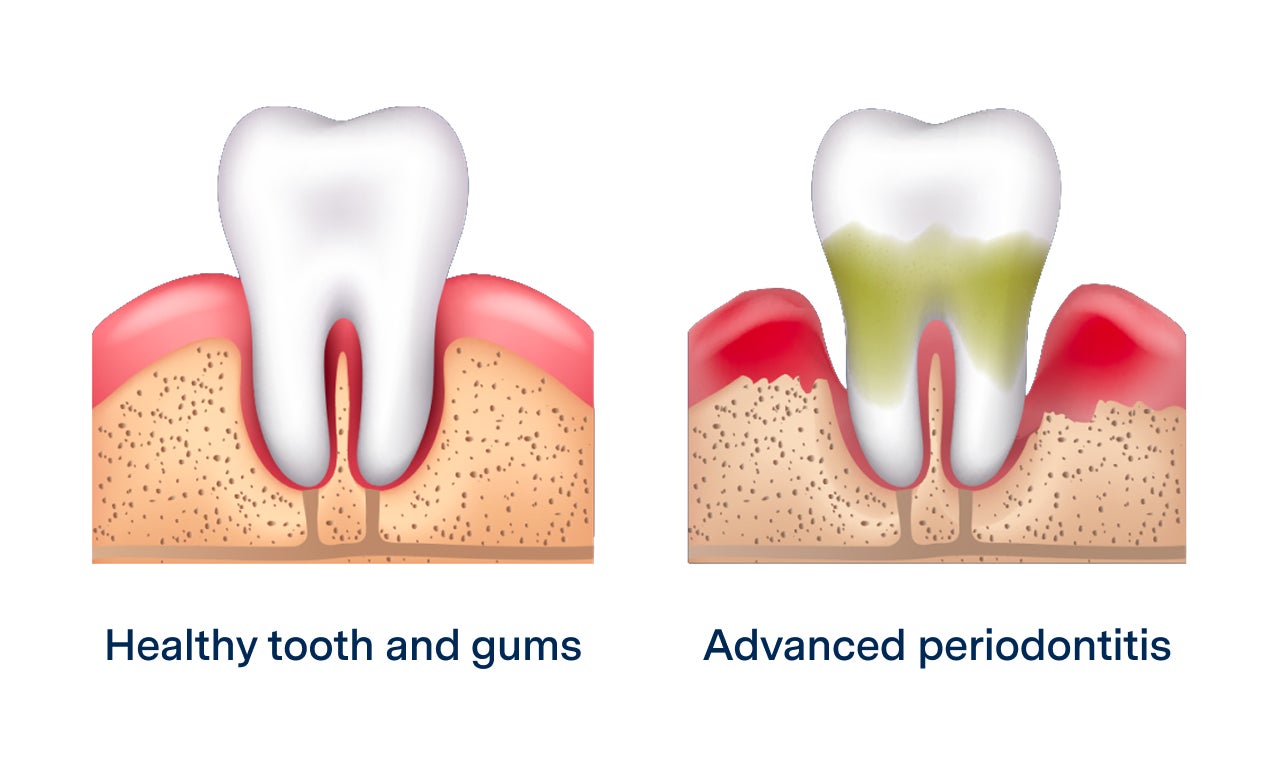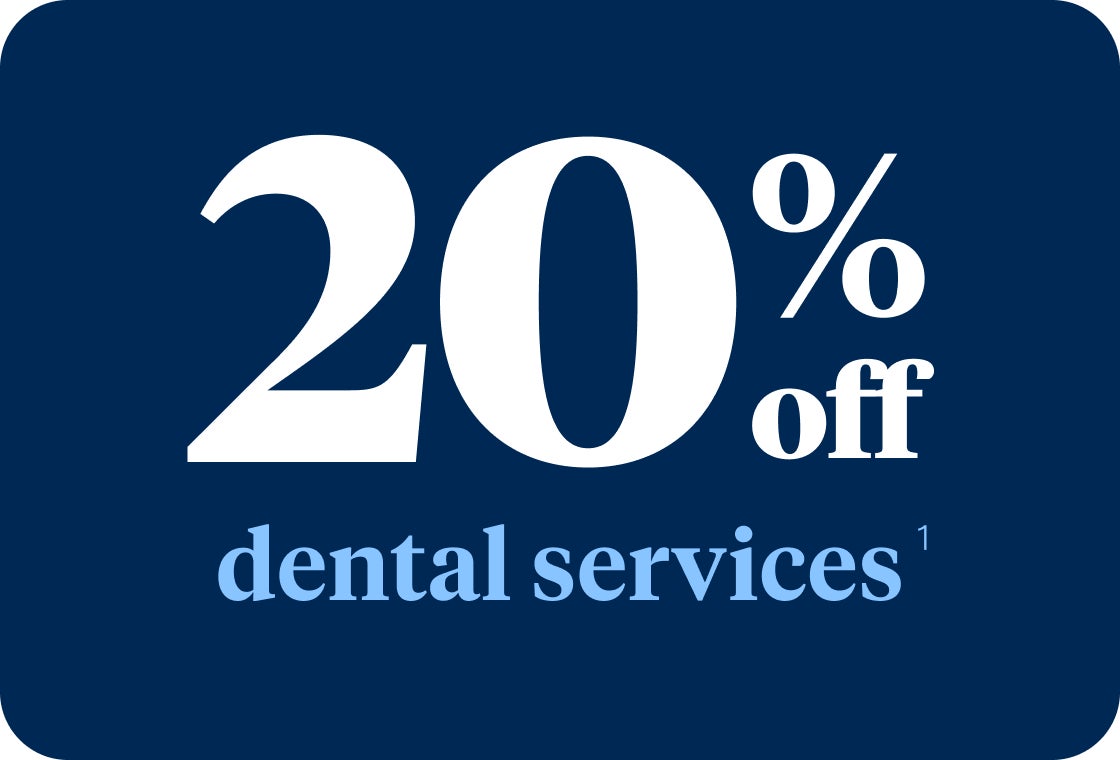
Periodontal disease treatment: symptoms, stages and cost
Periodontal disease, also known as gum disease, often goes unnoticed until it becomes serious. Aspen Dental makes treatment clear, affordable and focused on protecting your long-term oral health.
What is periodontal disease?
Periodontal disease is a progressive infection caused by plaque that hardens into tartar and triggers inflammation in the gums. Without daily preventative treatments, the infection can spread to the bone and lead to tooth loss. Research also links periodontal disease to overall health concerns, including diabetes, heart and respiratory conditions.
Stages of periodontitis (gum disease)
Gingivitis
Gingivitis is the only reversible stage of gum disease, often marked by bleeding or irritated gums. With consistent care, your gums can return to full health.
Mild periodontitis
Mild periodontitis begins when untreated gingivitis leads to tissue damage and deeper pockets, requiring a deep cleaning to help control the disease.
Moderate periodontitis
Genetics and health history play a big role in periodontal disease. Your genetic makeup can make you more vulnerable, especially in aggressive cases. How fast it progresses can also be affected by health risks such as diabetes or smoking habits.
Advanced periodontitis
Severe periodontitis leads to major bone loss and loose teeth. Advanced treatments like surgery or grafts may be required.

What causes periodontal disease?
Several factors can increase a person’s risk of developing gum disease:
Poor oral hygiene habits
Smoking or vaping
Genetics (some individuals are predisposed)
Diabetes and other systemic illnesses
Hormonal changes (pregnancy, menopause)
Stress, which weakens the immune response
Certain medications
Poor nutrition
Have you experienced any of these symptoms of periodontal disease?
Gums that bleed easily
Red, swollen, or tender gums
Persistent bad breath or taste
Loose or shifting teeth
Painful chewing
Deep pockets around teeth
Spaces between teeth
How we diagnose periodontal disease at Aspen Dental

Dental X-rays
X-rays show bone loss you can’t see. They give your Aspen Dental dentist a clearer view of your gum health.

Periodontal charting
The periodontal charting indicates the level of heath of your gums. The higher the number, the worse the infection and inflammation.

Genetics & health history
Genetics and overall health can raise your risk for periodontal disease. Factors like diabetes or smoking can also make it progress faster.
How to treat periodontal disease
Non-surgical treatments
For mild to moderate cases, scaling and root planing, also known as deep cleaning is often recommended. This removes plaque and tartar below the gumline and smooths the roots to help gums heal. It’s one of the most effective nonsurgical ways to stop gum disease form progressing.
Surgical treatments
Advanced periodontal treatments can help restore damaged gums and bone. Options may include flap surgery, bone grafts, or techniques that encourage new tissue growth—all designed to support healing and strengthen the foundation of your teeth.
What to expect at your periodontal treatment appointment
Assess teeth and gums
Scaling and root planing, also known as deep cleaning, removes tartar and bacteria under the gums, and a localized antibiotic may be used to help treat infection.
Reduce inflammation
We do additional gum tissue treatments, such as periodontal irrigation and laser to disinfect the tissues to reduce inflammation and support gum health.
Remove bacteria
A localized antibiotic is placed in the gum pockets to target bacteria and reduce inflammation, helping improve your overall treatment results.
Cost of periodontal treatment at Aspen Dental
Periodontal treatment costs depend on disease severity, treatment and how many areas need care. Early cases may be treated non-surgically, while advanced disease may require antibiotics, laser therapy or periodontal surgery. Complexity and follow-up needs can also impact cost.

Save today on your periodontal treatment
Both new and returning patients can take advantage of our special offer and save 20% on eligible dental services¹
¹Offer available in select offices. Not valid for previous or ongoing work and cannot be combined with other discounts or dental discount programs. Not valid on Basic or Classic dentures or orthodontia. Discount taken off usual and customary fees for general dentistry services and does not apply to services rendered by a specialist. Patients with insurance will receive either the 20% discount or insurance plan pricing, whichever discount is greater. Offer expires 12/31/26.
Affordable periodontal care at Aspen Dental
Most insurance accepted
Aspen Dental accepts most insurance plans, including partial coverage for deep cleanings and maintenance. Please note we do not accept Medicaid.
Third-party financing options
Aspen Dental offers flexible financing through 3rd-party lenders, giving patients the option to apply for payment plans that make care more manageable.
Transparent, upfront pricing
Aspen Dental provides clear, up-front pricing, giving patients a transparent understanding of their treatment costs so they can move forward with confidence.

How to prevent periodontal disease
Prevention is the most effective and affordable approach.
To reduce your risk:
Brush twice daily with fluoride toothpaste
Floss daily
Avoid smoking or vaping
Maintain a balanced diet
Visit your dentist every 6 months for a dental check-up
Address dry mouth promptly
Manage systemic conditions like diabetes
Periodontal maintenance
Professional care plan
Periodontal bacteria regrow every three months. A 90-day maintenance visit helps keep your gums healthy and includes:
Thorough oral hygiene guidance
Meticulous gum evaluation
Precise periodontal charting
Scaling and root planing
Professional irrigation using antibacterial solutions
Periodontal home care
Here are a few ways to maintain good oral health at home and help keep gum disease at bay.
Brush twice a day
Use an electric toothbrush
Use prescription-strength toothpaste
Floss with a power floss device
Rinse with medicated mouthwash
Periodontal disease treatment FAQs
How can I cure (or reverse) periodontal disease?
Gingivitis is reversible, but periodontitis cannot be cured. With treatment and regular maintenance, it can be controlled and prevented from progressing.
Is periodontal disease contagious?
It can spread through saliva, but good daily oral hygiene and regular dental visits can help reduce the risk.
Is periodontal disease treatment painful?
Most patients feel little discomfort during deep cleaning with local anesthesia. Mild soreness is normal afterward, and laser therapy can help ease pain and speed healing.
How long does periodontal treatment take?
Scaling and root planing takes 1–2 visits and heals in a few weeks. Maintenance every three months is recommended.
What happens if periodontal disease is not treated?
Untreated gum disease can cause the infection to spread, bone loss and tooth loss, and may impact overall health. It can also lead to additional treatment and costs down the line.
Can receding gums grow back?
Gum recession rarely reverses naturally. Gum grafting procedures can restore tissue coverage and improve appearance and sensitivity.
What periodontal services does Aspen Dental offer?
Aspen Dental provides comprehensive periodontal care, including evaluations, scaling and root planing, maintenance visits, localized antibiotics and treatment for gum inflammation or recession.
What is periodontal therapy?
Periodontal therapy treats gum disease by reducing inflammation and protecting bone and tissue. It includes scaling and root planing to clean deep below the gumline, antibacterial care and surgical options when needed.
Can I get same-day treatment for periodontitis near me?
Local same-day appointments—and sometimes same-day periodontal care—may be available. Contact your nearest Aspen Dental office for current openings.
Ready to start periodontal disease treatment?
Periodontal disease is common, but it doesn’t have to compromise your smile. With early detection, modern treatment options, and consistent maintenance, you can protect your gums, preserve your teeth, and support your overall health.